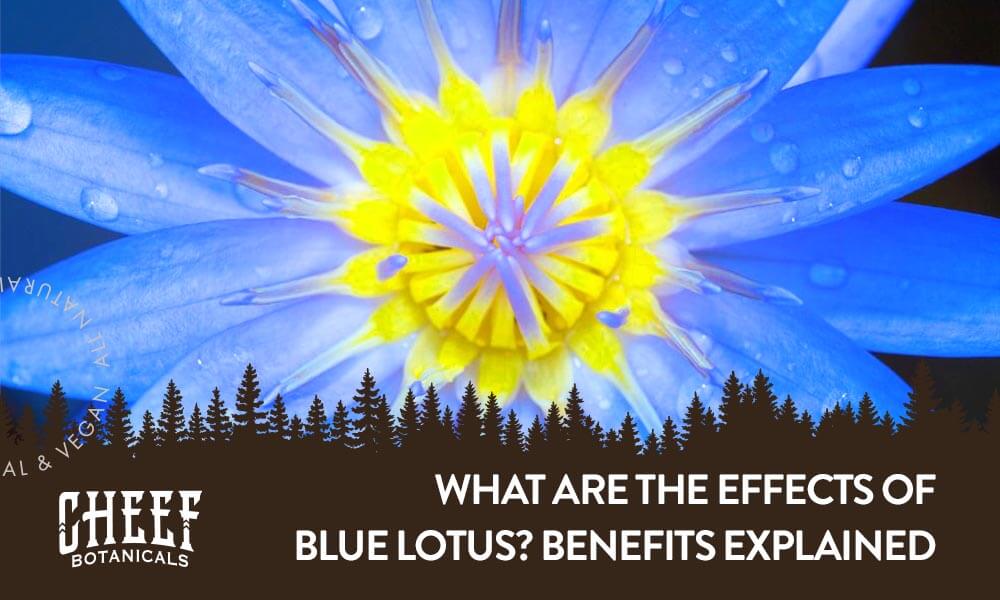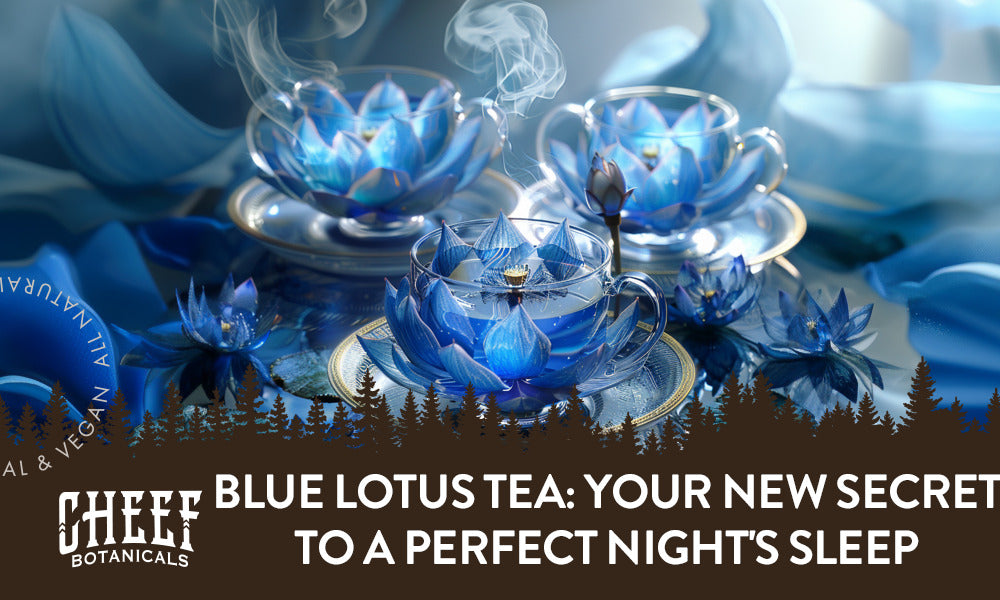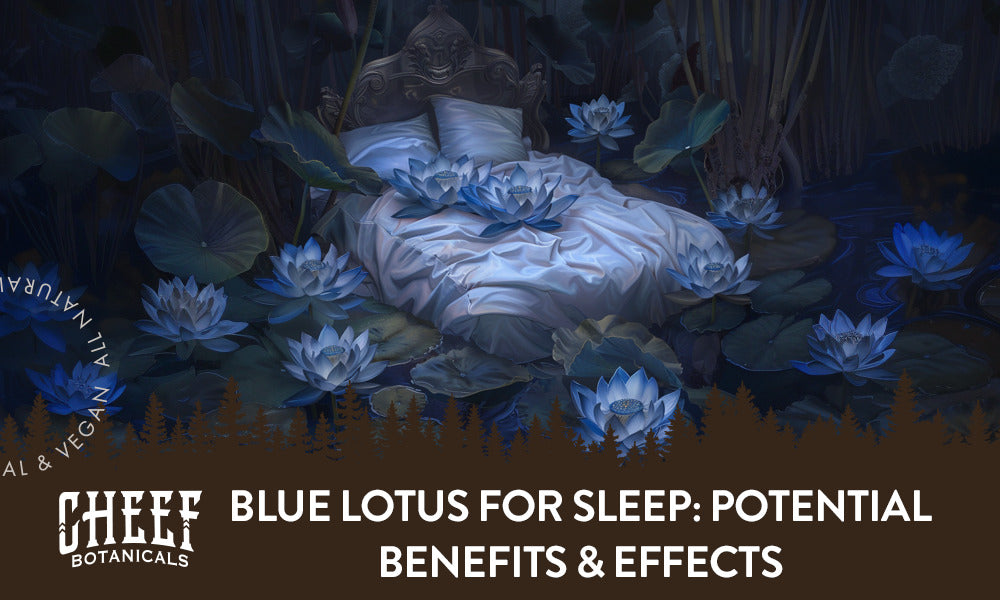Have you ever wondered about the magic behind blue lotus? Blue lotus effects range from subtle relaxation to lucid dreams. This fascinating flower has captivated people for centuries. From ancient Egyptian culture to modern herbal remedies, blue lotus has a rich history and various benefits.
See why blue lotus remains beloved in many cultures. Find out more about its benefits, historical significance, and how you can incorporate it into your wellness routine. There's plenty to discover, whether you're curious about its traditional uses in religious ceremonies or its modern applications for stress relief and sleep quality.
What Is the Blue Lotus Flower?
The blue lotus flower, also known as the blue water lily, is a stunning aquatic plant with bright blue petals. Native to the shallow, muddy waters of the Nile River in Egypt, this flower has deep cultural significance. Despite its name, blue lotus is not a true lotus but a type of lily called Nymphaea caerulea.
Ancient cultures, including the Egyptians, Chinese, Japanese, and Greeks, valued the blue lotus for its spiritual and medicinal properties. It was consumed to promote relaxation, improve sleep quality, and enhance mood. This flower's unique properties made it a key part of religious ceremonies and traditional medicine.
Today, blue lotus is still valued for its soothing effects and potential health benefits. It's commonly used in herbal remedies and can be found in various forms, like blue lotus tea and dried petals. People seek blue lotus for its ability to promote natural relaxation and support overall well-being.
Primary Active Compound Ingredients
Blue lotus flower owes its therapeutic effects to two main compounds: apomorphine and nuciferine. These active compounds significantly affect how blue lotus interacts with your body.
Apomorphine
Apomorphine, a psychoactive compound, stimulates serotonin receptors and parts of the brain influenced by dopamine. This makes it useful in promoting relaxation and enhancing mood. In medical settings, doctors use apomorphine to treat sleep problems and anxiety. It is also one of the oldest drugs used for managing Parkinson's disease, especially in Europe, where it helps patients with advanced motor issues.
Nuciferine
Nuciferine, another key compound in blue lotus, helps relax arteries and reduce redness. This can contribute to its calming effects, making it beneficial for anxiety relief and sleep support. Nuciferine also has potential benefits for muscle performance and weight management. Some studies suggest that nuciferine might have applications as an antipsychotic, with effects similar to the drug clozapine.

What Are the Benefits and Effects of Blue Lotus?
The blue lotus flower offers various benefits that can enhance your overall well-being. Known for its soothing effects, this timeless plant has been used in ancient traditional medicine. Let's explore how blue lotus can promote relaxation, support sleep, and more.
Promotes Soothing Relaxation
Blue lotus has relaxation-inducing properties that help ease stress. When you consume blue lotus tea or dried blue lotus flowers, you can experience a calming effect on your body and mind. The active compounds, apomorphine, and nuciferine, promote relaxation and reduce nervousness. Many people turn to it for its ability to help them unwind after a long day.
Supports Sleep
Blue lotus flower supports natural sleep by helping you relax before bedtime. Drinking blue lotus tea or using other forms of blue lotus may improve sleep quality. This ancient plant's calming properties make it a great natural remedy for those looking to enhance their sleep. By promoting relaxation, it helps you drift off into a peaceful slumber.
May Ease Discomfort
Thanks to its active compounds, blue lotus may also ease discomfort. Nuciferine may promote relaxation of arteries and reduce puffiness, relieving muscle tension and soreness. Consuming blue lotus might help you manage everyday aches and irritation. Its soothing effects make it a famous choice for natural discomfort relief.
Vivid Dreams and Lucid Dreaming
One of the intriguing aspects of blue lotus is its ability to promote vivid dreams and lucid dreaming. Consuming blue lotus may enhance your dream experiences, making them more colorful and memorable. Many consumers report more control over their dreams when consuming blue lotus. This unique effect adds to the flower's appeal for those interested in exploring their subconscious mind.
Focused Euphoria
Blue lotus may provide a sense of focused euphoria without the intoxicating effects of other plants. This makes it a potential option for mood enhancement and mental clarity. The active compounds can help elevate your mood. Enjoying blue lotus tea or dried flower petals may bring a sense of blissful focus to your day.
Mood Enhancement
Blue lotus flower may enhance your mood by offering relaxation and calming anxious behaviors. The natural compounds in blue lotus interact with your nervous system to promote a sense of ease and well-being. Drinking blue lotus tea or using dried petals may help improve your overall mood. This makes blue lotus a popular choice for those looking to boost their emotional well-being.
Complements Meditation Practices
Blue lotus is an excellent companion for meditation practices. Its calming effects help you relax, making it easier to focus during meditation. Consuming blue lotus tea before meditating may enhance your overall experience. The soothing properties of blue lotus promote a peaceful mind, allowing you to fully immerse yourself in your practice.
Emotional Reprogramming
Blue lotus may support emotional reprogramming by helping you achieve a state of calm and reflection. Its soothing effects make it easier to process and release negative thoughts. Consuming blue lotus may promote emotional balance and positive thinking. This natural remedy is valuable for anyone looking to enhance their emotional well-being.

How Do You Take Blue Lotus to Feel the Effects?
In the past, people mainly smoked blue lotus or used it in teas to feel its effects. Today, there are more modern options like vapes or edibles, including our Cheef Botanicals gummies, tinctures, and more. Each option is still used today, so it really depends on your preference.
- Teas. Making blue lotus tea involves steeping dried blue lotus flowers or petals in hot water. This method releases the active compounds, providing a soothing and relaxing effect.
- Edibles. You can also consume blue lotus as edibles. Our all-natural gummies offer a delightful way to enjoy the benefits of blue lotus, making it easy to incorporate into your daily routine.
- Tinctures. Tinctures are another effective method. By placing a few drops under your tongue, you can quickly absorb the active compounds of blue lotus.
- Smoking. Smoke blue lotus is a traditional method that delivers the effects rapidly. You can use dried blue lotus flowers for this purpose.
- Vaping. Vaping offers a modern twist. It provides a similar experience to smoking but with potentially less irritation to your throat and lungs.
Cheef Botanicals gummies highlight the convenience and taste of blue lotus in edible form. Tinctures are also a quick and easy way to experience blue lotus effects.
If you prefer traditional methods, smoking and vaping blue lotus are still popular choices. Each method offers unique benefits, so choose what works best for you.
When Do The Effects Kick In, And How Long Do They Last?
The effects of blue lotus can start at different times depending on how you use it. If you drink blue lotus tea or use tinctures, you might start to feel relaxed and at ease within about 15 to 30 minutes. Smoking or vaping blue lotus can bring on effects even quicker, often within a few minutes. Generally, these soothing effects can last for about 3-5 hours, giving you enough time to enjoy the calming benefits.
Are There Any Side Effects of Blue Lotus?
Blue lotus is generally considered safe when you consume it in small amounts. However, remember that the FDA hasn't approved the consumption of this plant. If you use blue lotus, especially in larger doses, you might experience some side effects.
You could feel dizzy, confused, or have a dry mouth. Some people also notice nausea, vomiting, slurred speech, chest pain, and drowsiness. These symptoms usually go away on their own within a few hours.
To lessen the risk of potential side effects, start with a small amount of blue lotus and slowly increase it. This method helps your body get used to the blue lotus effects safely. Consult a healthcare professional first, especially if you already have health issues or are on other medications.
Safety and Precautions
When using blue lotus, following safety guidelines is important to ensure a positive experience. Here are some key precautions to keep in mind:
- Start Small. Begin with a low dose of blue lotus to see how your body reacts before increasing the amount.
- Consult Healthcare Professionals. Talk to a healthcare professional before starting blue lotus, especially if you have health issues or take other medications.
- Check for Allergies. If you have allergies to other plants or herbs, you might also react to blue lotus. Test a small amount first.
- Avoid High Doses. Using blue lotus in high doses can lead to adverse effects like confusion and dizziness. Stick to recommended amounts.
By following this advice, you can safely enjoy the benefits of blue lotus. Buy from reputable sources like Cheef Botanicals to ensure quality and safety.

How Were The Effects Of Blue Lotus Utilized In The Past?
Ancient cultures have valued the blue lotus for its beautiful look and various uses. This aquatic plant played a big role in cultural symbols and practical treatments across different societies. Let's explore how various cultures used the blue lotus.
Ancient Egyptian Utilization
In Ancient Egypt, the blue lotus was seen as a symbol of the sun and rebirth. Every morning, its petals opened up to welcome the sun, reflecting the daily renewal of life, which was important to their sun god, Ra. Egyptians used the blue lotus in religious ceremonies, believing it helped connect the physical world to the spiritual one. You can see this sacred flower in many ancient Egyptian artworks, showing its role in reaching the divine and the afterlife.
Buddhism and Hinduism Utilization
In Buddhism and Hinduism, the blue lotus stands for purity, enlightenment, and spiritual symbol. Buddhists view the blue lotus as a strong aid in meditation and a symbol of wisdom. In Buddhist stories, a lotus bloomed wherever the baby Buddha walked, adding to its spiritual importance. Hindus also value the blue lotus as a sign of divine beauty and purity, often seen in pictures with Vishnu, symbolizing protection and care.
Traditional Uses of Blue Lotus in Medicine
Blue lotus has played a significant role in traditional medicine due to its ability to alleviate stress and enhance sleep quality. Renowned for its calming effects, this aquatic plant was frequently included in remedies to help people relax and sleep better. In Ayurveda, one of the oldest healing systems, the scent of blue lotus was used to promote deep breathing and relaxation, aiding in sleep and meditation. It was also valued for its psychoactive properties, believed to help reduce emotional stress and potentially enhance lucid dreaming. The plant held a prominent place in ancient rituals of the Egyptians and Mayans, where it was used as an aphrodisiac. Consumed in sacred wines during elite gatherings, it was believed to boost mood and increase libido. The compound nuciferine in blue lotus was thought to address muscle-related issues, such as erectile dysfunction. 
Final Thoughts - Blue Lotus Effects & Benefits
Blue lotus, also known as Egyptian lotus or blue water lily, is celebrated for its natural ability to help with relaxation and sleep. Consider trying blue lotus if you're looking for ways to calm your mind and improve your well-being.
This incredible aquatic plant has been used for centuries to enhance relaxation, support better sleep, and encourage vivid dreams. Whether you enjoy it as blue lotus tea or try convenient tinctures or gummies, these lotus plants could be a great addition to your relaxation routine.
Discover the benefits of blue lotus and see how this ancient, revered plant can make a difference in your life today!
Top-Rated Products Featuring Blue Lotus



 Blue Lotus Gummies For Sleep - Top Seller
Blue Lotus Gummies For Sleep - Top Seller
 Blue Lotus Tincture - Excellent Choice
Blue Lotus Tincture - Excellent Choice
 Bundle & Save: Ultimate Festival Bundle - Highly Rated
Bundle & Save: Ultimate Festival Bundle - Highly Rated



Leave a comment
This site is protected by hCaptcha and the hCaptcha Privacy Policy and Terms of Service apply.